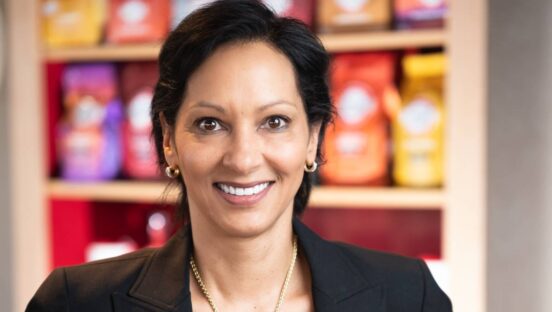In 2022, the U.S. Census Bureau reported that 30 percent of franchise businesses were owned by minorities, compared to 18.8 percent of non-franchised ones. Minority and female ownership across the quick-service sector has continued to climb due to targeted industry discussions and spotlight events. But there is still work to do when it comes to elevating, educating, and empowering women who are looking to break into franchising.
Robin Gagnon, cofounder and CEO of leading restaurant brokerage firm We Sell Restaurants, has dedicated her life to the world of franchising. She is a certified franchise executive with the International Franchise Association, serving on its board of directors and chairing its Women’s Franchise Committee.
“[Women in franchising] are so near and dear to my heart,” Gagnon expresses. “I have spent the last eight years on the Women’s Franchise Committee, and I feel as if women still need to know it’s okay to raise their hand and ask for help. Help is an immensely powerful, four-letter word.”
She recognizes there are a multitude of challenges confronting women in franchising, including finding access to capital, putting lending deals and financial packages together, and understanding different revenue requirements and sources.
The largest hurdle women must climb is the lack of education about available programs. Brands including Wendy’s, Pizza Hut, Taco Bell, and Wetzel’s Pretzels have created initiatives to accelerate minorities in franchising, but more awareness is still needed.
“Brands are recognizing that women make incredible contributions, but as a society, and particularly as women already in leadership, we have to be willing to help one another,” Gagnon says. “Women are natural mentors because we’re nurturing, right? So, there must be this continual sharing of community within the franchise world to make sure women know they are treasured, and they can go for it.”
Pizza Factory president and CEO MJ Riva was a franchisee of the brand for 30 years prior to acquiring it. She has a lifetime of experience in the food industry, starting at a donut shop when she was 16.
She’s an advocate for the franchise model and understands the industry’s efforts to communicate and educate prospective franchisees about what it can offer. However, Riva believes the segment falls short of having a wide enough reach to all audiences.
“There are demographics we still need to reach and get them to understand what franchising really is and break those misconceptions about it,” Riva says. “There’s always going to be a challenge … but there are more women-focused mentoring groups than ever right now, giving women the support they need.”

Riva stresses the importance of gathering groups of women and hosting open discussions around the topic of franchising, whether through mentorship meetups, conferences, or workshops. She says having a listening ear is crucial to receiving guidance against any obstacle.
Riva also acknowledges that some brands have showcased female-led contributions and the incredible power of women helping others climb the ladder.
“It’s not that the field is starting to level … It’s more so the idea of women becoming more empowered, and they’re starting to realize there’s a lot of things we can do with the support of other women and make a big difference,” Riva says. “We’re seeing more and more women CEOs in the United States right now.”
Like Gagnon, Riva’s advice is to have the courage to reach out for help when needed, and she advises women to stay true to themselves and their vision. While conferences can be expensive, she emphasizes how imperative they are for finding people who are open and willing to lend a hand and answer questions.
“Don’t ever change your path … know the difference you’re trying to make, and stick to it,” Riva says. “If you’ve chosen [to enter franchising] and be a leader, you’ve done it for a reason, so lead with that in mind.”
Kim Ellis, chief development officer of Scooter’s Coffee, believes it’s easy to get stuck in the mindset of viewing being a woman in franchising as a barrier instead of something to leverage and be proud of.
“I always think it’s an interesting topic when it comes to being a woman or a minority [in franchising] as I am both, and I don’t see it as an obstacle,” Ellis says. “Sometimes I don’t think we should have a mindset that there are barriers … our mindset might be the barrier itself.”
Her biggest advice for women overcoming mental or physical hurdles to franchising? Similar to Gagnon and Riva, she’s an advocate for the power of finding the right mentors. Ellis has had the same teacher for 35 years—a savvy businesswoman she met during her tenure at Blockbuster.
“My secret to success is surrounding myself with a mixture of mentors to help support my weaknesses and development,” Ellis says. “For me, finding a powerful woman with a voice in the room inspired me [to do the same].”
Ellis compares success in the franchising world, especially for women, to a three-legged stool—the key is to secure mentorships, network at industry events, and overcome a limiting mindset that could potentially hold women back.
“Franchising, networking, and mentoring go hand-in-hand to allow people to gain valuable insights in this industry,” Ellis says. “This way, when people make decisions on the route they want to go, they know it’s an informed and educated one.”
Scooter’s has worked to have a healthy mixture of diverse franchisees, including women, men, and married couples. Ellis advises those who see their gender as a hardship to look beyond the surface level and, as Gagnon says, “go for it.”








